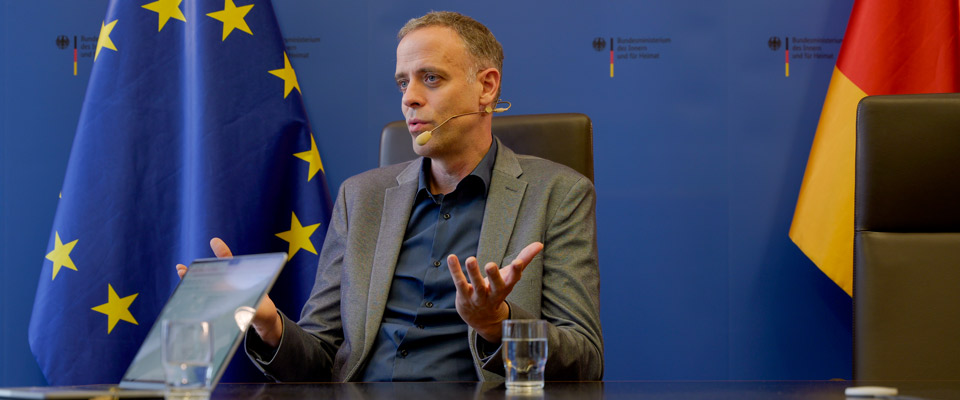Germany’s federal CIO Markus Richter – “Digital sovereignty is imperative.”
The digital transformation of government functions is a long-term project—a complex endeavour. Germany’s federal CIO Dr Markus Richter approaches this challenge with great verve and enthusiasm. He says: “I don’t believe there’s anything more exciting than digitalising our public administration, because it’s something that impacts our entire society.” In an interview, he shares his priorities, his vision of digital sovereignty, the challenges ahead, and why European collaboration is indispensable.
Written by
E-Mail: stefan.maurer@bechtle.com

Dr Richter, Estonia is often cited as a model country for the digital transformation of government. Do these constant comparisons ever bother you?
Not at all. In fact, we work closely with Estonia, but also with Denmark and Austria—countries that are further along their journey than we are. But I’ll also say that we have much to be proud of: We’re innovative, home to many outstanding start-ups, and our public administration has shown itself to be resilient in times of crisis and largely resistant to corruption.
But that’s not enough …
Indeed. Unlike Estonia, Germany has a much more complex setup. Estonia started from scratch in the 1990s, building on a greenfield. In contrast, our infrastructure is extensive and has developed organically over time. Similarly, while Austria manages data primarily at the national level, Germany keeps it largely in the municipal domain. For example, we have 5,000 data registers in Germany, whereas Austria has just one.
You mentioned collaborations with three countries. Are there others?
Yes, for instance, we’re working with France on an open-source workplace. We’ve established the Centre for Digital Sovereignty, which is equipped to provide this. Since France pursues a similar approach, this collaboration makes perfect sense.
How do you view open source in general?
I consider open source to be very important, and I’m proud that Germany is a pioneer in this field. Many national governments, as well as the United Nations, turn to us for our expertise.
And open source is part of Germany’s cloud strategy.
First and foremost, it’s important to note that this strategy wasn’t developed with just the federal ministries in mind. It was also aligned with the federal states and municipal associations. It applies across all layers of government and is, in fact, a multi-cloud strategy based on three pillars: First, depending on the criticality of the data, there is the possibility to use public cloud services. Second, providers can operate cloud services in secure environments. And third, there’s the open-source approach, offering maximum transparency.
It’s important to ensure that sovereignty doesn’t lead to isolation.
Dr Markus Richter
We can’t talk about the cloud strategy without also discussing European collaboration and digital sovereignty.
Absolutely. While many people see digital sovereignty as just a buzzword, I consider it essential, especially when it comes to IT security. However, it’s also important to ensure that sovereignty doesn’t lead to isolation. It’s not about banning certain solutions or excluding specific providers. On the contrary, we need to foster innovation, create opportunities, and encourage competition—like we’ve done with Gaia-X, for example.
A long-running European project to build a digital, open-source ecosystem of connected data spaces that’s still lacking in speed …
Absolutely. That brings me to an important point about Europe. We’ve made significant progress in harmonisation, established a solid legal framework, and recently achieved some great advancements. But now we need to focus much more on implementation within individual member states. At the moment, we’re still too fragmented and overly reliant on bi-directional connections.
In other words, you want Europe to work more closely together in the digital space?
In a nutshell. And Germany is well-positioned to take on a leading role because we have extensive experience in structuring collaboration within a federal system. We need to set up projects collaboratively from the outset and make use of shared tools.
One last question about the digital transformation in Germany. From the multitude of projects, if you could pick just one to make happen, which would it be
For me, the most important digital project is the wallet. What I mean by that is a digital wallet that holds my electronic identity, which I can use to authenticate myself, access and utilise data, as well as securely store documents and information. This also permeates every area of the private sector and makes our lives significantly easier.
Dr Markus Richter has served as State Secretary at the Federal Ministry of the Interior and Community and Federal Government Commissioner for Information Technology since May 2020. His role involves steering the development of a modern, secure IT landscape for Germany. He plays a key role in all strategic matters related to the use of IT in public administration and contributes to legislative processes and government initiatives that shape the IT infrastructure for digital public services.
